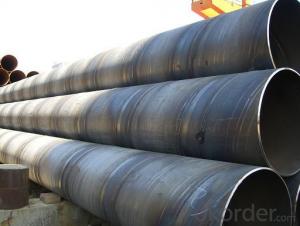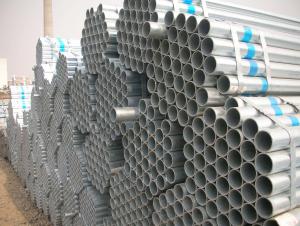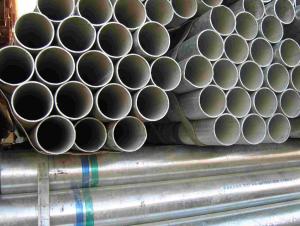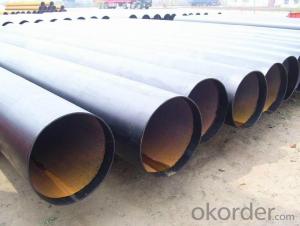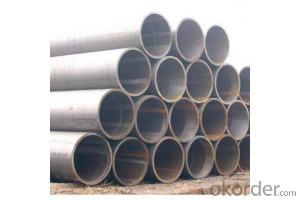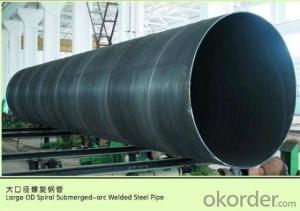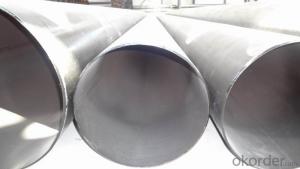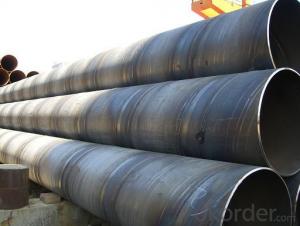LSAW SSAW CARBON STEEL PIPE ASTM API 5L PSL1/PSL2
- Loading Port:
- Tianjin
- Payment Terms:
- TT OR LC
- Min Order Qty:
- 1 m.t.
- Supply Capability:
- 3000 m.t./month
OKorder Service Pledge
OKorder Financial Service
You Might Also Like
Packaging & Delivery
Packaging Detail: | Normal exporting packing,in container or bulk vessel or as per clients' request |
Delivery Detail: | 2 months after confimed contract |
Specifications
Large Diameter API 5L X70 PSL2 LSAW Steel Pipe
Grade: X42, X46, X50, X52, X60, B, C
OD: 1.5"-28"
WT: SCH10-SCH160
Large Diameter API 5L X70 PSL2 LSAW Steel Pipe
Specifications:
u Standard: API 5L
u Grade: B, C, X42, X46, X50, X52, X56, X60, X65, X70, X80
u OD: 1.5"-28"
u WT: SCH10-SCH160
u Length: 5-12m
u Ends Finish: plain end, bevel end, grooved end
u Surface Treatment: bare, black varnished, oiled finish, red color, anti-corrosion, 3PE, FBE or epoxy coating
u Technique: hot rolled or cold drawn
u Application: api 5l steel pipe for conveying oil, water, gas
u Invoicing: based on theoretical weight or actual weight
u Payment Terms: L/C at sight, T/T or Western Union
u Trade Terms: FOB, CFR, CIF
u Certification: ABS manufacturing assessment, ABS design assessment, API 5CT, API 5L, DNV manufacturer certificate, ISO9001 quality management system certificate, ISO14001 environment management system certificate, GB/T28001 occupational health and safety management system certificate, A1 class manufacturing license of special equipment certificate, CCS, GL, LR, SGS, TüV, PDE
- Q: Are steel pipes suitable for industrial cooling systems?
- Indeed, steel pipes prove to be generally well suited for industrial cooling systems. Being a robust and long-lasting material, steel can endure the elevated pressures and temperature fluctuations commonly encountered in such systems. Furthermore, its exceptional resistance to corrosion renders it an ideal choice for utilization with water or other coolants. Moreover, steel pipes exhibit commendable thermal conductivity, facilitating efficient heat transfer during the cooling procedure. Additionally, these pipes are conveniently accessible and cost-effective, rendering them highly favored within industrial settings.
- Q: How are steel pipes cleaned and maintained?
- Steel pipes are cleaned and maintained through a combination of mechanical and chemical methods. Mechanical cleaning involves removing any loose debris or scale using tools like wire brushes or high-pressure water jets. Chemical cleaning may be used to dissolve any stubborn deposits or corrosion using suitable solvents or acids. Regular inspection and maintenance are essential to identify and address any potential issues such as leaks, rust, or structural damage. Coatings, such as paint or anti-corrosion materials, are often applied to protect steel pipes from environmental factors and extend their lifespan.
- Q: What are the factors to consider when selecting pipe materials for high-temperature applications?
- When selecting pipe materials for high-temperature applications, there are several factors that need to be taken into consideration. Firstly, the material's thermal conductivity is crucial. High-temperature applications require materials with high thermal conductivity to ensure efficient heat transfer and prevent heat buildup. Materials such as copper and stainless steel have excellent thermal conductivity and are commonly used in high-temperature pipe installations. Secondly, the material's resistance to thermal expansion is important. When exposed to high temperatures, pipes tend to expand. Therefore, it is crucial to choose materials with low thermal expansion coefficients to prevent deformation and potential pipe failure. Materials like carbon steel and stainless steel exhibit relatively low thermal expansion and are suitable for high-temperature applications. Thirdly, the material's mechanical strength and resistance to corrosion need to be considered. High temperatures can cause certain materials to weaken or corrode, leading to structural failures. It is essential to select materials that can withstand high temperatures without compromising their mechanical strength or corroding easily. Materials like alloy steel and nickel-based alloys are known for their high strength and resistance to corrosion, making them suitable for high-temperature applications. Furthermore, the material's cost and availability should be taken into account. Some high-temperature pipe materials may be expensive or difficult to obtain, which can impact the overall project budget and timeline. It is essential to balance the desired material properties with the project's financial and logistical constraints. Lastly, the specific application requirements and industry standards should be considered. Different industries may have specific guidelines or regulations regarding pipe materials for high-temperature applications. It is crucial to ensure that the selected materials comply with these standards to ensure safety, reliability, and compliance with industry regulations. In conclusion, the factors to consider when selecting pipe materials for high-temperature applications include thermal conductivity, resistance to thermal expansion, mechanical strength, resistance to corrosion, cost and availability, and compliance with industry standards. By carefully evaluating these factors, one can choose the most suitable pipe material to ensure efficient and reliable operation in high-temperature environments.
- Q: Are steel pipes suitable for hydronic heating systems?
- Yes, steel pipes are suitable for hydronic heating systems. Steel pipes are known for their durability and strength, making them a reliable choice for transporting hot water or steam in a hydronic heating system. They can withstand high temperatures and pressures, ensuring efficient heat transfer throughout the system. Additionally, steel pipes are resistant to corrosion, which is important in preventing leaks or damage to the pipes over time. However, it is essential to properly insulate steel pipes to minimize heat loss and improve energy efficiency in the hydronic heating system. Overall, steel pipes are a popular and suitable option for hydronic heating systems due to their reliability, durability, and ability to handle the demands of heating water or steam.
- Q: What is the difference between steel pipe and round steel?
- The middle of the steel pipe is hollow, and the round steel is solid. When compared with the solid steel such as round steel, the steel tube has the same flexural strength and torsion strengthLight weight, is an economic section of steel, widely used in the manufacture of structural and mechanical parts, such as oil drilling pipe, automobile transmission shaft, bicycle frame and steel scaffolding used in construction.
- Q: Seamless steel pipe and welded pipe what is the difference?
- The welded pipe is made directly from the stainless steel band by machine, and it is made of round steel or perforated by Guan Pi
- Q: How are steel pipes used in the manufacturing of machinery?
- Steel pipes are commonly used in the manufacturing of machinery for various purposes such as conveying fluids, gases, or solids, and providing structural support. They are used to transport materials within the machinery, including coolant, lubricants, and gases. Steel pipes also play a crucial role in creating the framework or structure of machinery, providing stability and strength. Additionally, they are used for creating pneumatic systems, hydraulic systems, and exhaust systems in machinery.
- Q: How are steel pipes marked for identification?
- Steel pipes are typically marked for identification using various methods such as color coding, stenciling, engraving, or applying tags with relevant information such as size, grade, manufacturer, and specifications.
- Q: How are steel pipes used in the manufacturing of irrigation systems?
- Steel pipes are commonly used in the manufacturing of irrigation systems due to their durability, strength, and ability to withstand high water pressure. These pipes are used to transport water from the source to the farmland or fields, ensuring efficient and reliable irrigation. Additionally, steel pipes are corrosion-resistant, making them ideal for use in various environmental conditions.
- Q: Can stainless steel pipes spray black paint?
- Can. The surface roughening with a thick gauze, do not use ordinary paint intensity difference. With resin paint, paint can be
Send your message to us
LSAW SSAW CARBON STEEL PIPE ASTM API 5L PSL1/PSL2
- Loading Port:
- Tianjin
- Payment Terms:
- TT OR LC
- Min Order Qty:
- 1 m.t.
- Supply Capability:
- 3000 m.t./month
OKorder Service Pledge
OKorder Financial Service
Similar products
Hot products
Hot Searches
Related keywords
